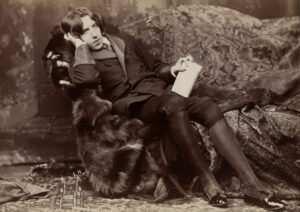Facing disaster in Brooklyn, Washington rolled the dice across the East River—and won
WHEN HE LEARNED late on August 27, 1776, that British troops had routed the Americans on Long Island, Admiral Lord Richard Howe must have thought that his chance to be the peacemaker who saved the colonies for the empire finally had arrived. Howe moved quickly. He took it for granted that the king’s men had trapped George Washington’s army on Brooklyn Heights, where the Americans would surrender in a day or two. General William Howe, the admiral’s brother, was so confident of victory that he was not requesting any additional support from the navy. Admiral Howe wrote to Commodore Hotham, “I have the satisfaction to hear from General Howe that he has every reason to be contented with the prospects before him.”
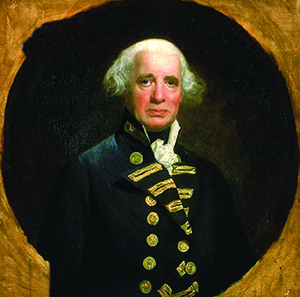
Indeed General Howe was. He and his brother, the admiral, believed they had achieved their primary aim—defeating Washington’s army. Lord Howe expected the war to end, ushering in a new era in relations between colonies and mother country. Instead of concentrating on penning up Washington’s army in Brooklyn Heights, Howe focused on getting negotiations started right away. He ignored the obvious need to patrol the East River. He could easily have sealed off that waterway and made certain Washington was trapped. No matter what the weather, Howe had the resources to keep the river clear of rebel boats.
Instead, Howe forgot about the East River and turned his mind to the Continental Congress and the Long Island defeat’s effect on the delegates. He hoped the loss would change enough minds to set in motion a new dialogue. Preoccupied with the peace initiative, Howe never considered that the rebel army might survive. Even though there were unmistakable signs that Washington might try to retreat across the river, Lord Howe ignored them. He overlooked the unusual amount of rebel activity on the water, as men collected large numbers of boats to bring the defeated army back to Manhattan.
On August 28, as fighting continued in Brooklyn, Howe invited to his flagship, the Eagle, captured American generals William “Lord Stirling” Alexander and John Sullivan, hosting his prominent prisoners at dinner for a long conversation about the possibilities of peace. Sullivan, captivated by the talk, agreed to go to Philadelphia to convince Congress of the importance of at least listening to what Admiral Howe had to say.
That same day, Washington reinforced his army on Brooklyn Heights, bringing the total to 9,500. Among his troops were Colonel John Glover and his regiment of mariners from
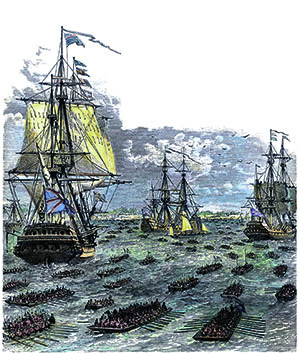
Marblehead, Massachusetts. Washington had decided to fight it out. He was not going to surrender, even though the odds against him were daunting. His men were tired and downcast, many of them sick or wounded, and for the most part, without shelter. The enemy was less than a mile away. British artillery was firing, and General Howe was beginning a formal siege, digging trenches 500 yards away that would bring troops and guns within easy striking distance without undue exposure. But a heavy rain developed, halting the siege work as the British moved into their tents.
The evening of the 28th, the rain let up. While Lord Howe was having dinner with Stirling and Sullivan, General Howe, assuming Washington had no place to go, resumed his siege, with engineers again digging trenches.
As newer patriot militiamen listened with dread to shovels moving dirt and stone, even Washington was having second thoughts. When he rode over the ground early on August 29, he realized there was no hope if he stayed put. He had made a terrible mistake, splitting his amateur army and trying to defend Brooklyn Heights against a force more than twice the size of his. Washington’s close confidant, Adjutant General Joseph Reed, confirmed this dismal view. Washington quickly decided to attempt a retreat, even though Lord Howe controlled the East River. As Congress required, the American leader called a council of senior officers, who agreed that the entire rebel army should leave that night.
Before the dramatic council meeting, Washington had already sent orders to General William Heath to round up all available boats and assemble these craft on the Manhattan side of the East River, across from the encampment at Brooklyn Heights. If Admiral Howe was paying attention, Washington wanted him to think he was bringing more troops from Manhattan to Brooklyn.
Heath ordered Colonel Hugh Hughes, assistant quartermaster general in New York, to round up every boat he could lay hands on. Once the boats were in place, he could have Glover and Colonel Israel Hutchinson man them from their regiments of mariners from the Massachusetts towns of Salem, Beverly, Gloucester, Cape Ann, Danvers, and Marblehead. Tough fighters and excellent seamen, the New Englanders would have the seemingly impossible job of bringing Washington’s troops, horses, and equipment across the East River at night under the noses of the Royal Navy and its renowned fighting admiral.
As the sun set, strong winds were blowing from the northeast, keeping Lord Howe’s big warships out of the East River. Smaller British craft with swivel guns at their prows easily could have worked up the river to disrupt Washington’s operation. Fortunately, Admiral Howe was preoccupied with organizing peace. His boats were nowhere to be seen.
In a gamble of a high order, Washington hoped to bring off all 9,500 men, with their horses, equipment, and supplies. As Glover and Hutchinson raced to ready and crew every boat, Washington watched for the Royal Navy. He naturally worried that Lord Howe’s small boats might sound an alarm, triggering a frontal assault by the other Howe. The navy then could have wreaked havoc on Glover’s small boats, loaded with men, at the middle of the East River.
But Admiral Howe, who had a well-deserved reputation for attention to detail, hadn’t the least suspicion what was up. His confidence that Washington wasn’t going anywhere enlarged when that vicious storm blew in on August 29.
Pelting rain seemed to make it even less likely that the rebels would attempt to withdraw over the water.
Actually, the storm made that very process easier, by concealing activity on either shore. The operation began at 8 p.m. with Washington everywhere, directing and encouraging. The northeast wind threatened to sweep the rescue craft downriver and into the arms of Lord Howe’s sailors.
Despite the conditions, the Massachusetts mariners rowed men and equipment across the East River through the night.
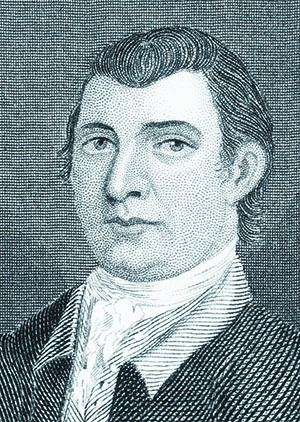
The wind abated around 11 p.m., making the going far easier but also renderinging the rebel flotilla more visible and vulnerable. Glover and his men kept at it. At daybreak, a providential fog covered the final stages of the retreat. Incredibly, General Howe’s men did not discover what was going on until the Americans had nearly finished their evacuation, executing Washington’s plan as perfectly as could have been. British soldiers fired on the last of the retreating patriots but succeeded in wounding only four. None was killed. The British captured three loaders who had stayed behind. Admiral Howe’s failure to detect or prevent the retreat was a colossal oversight that would cost him and his cause dearly.
Washington’s departure left General William Howe in control of Brooklyn Heights with a minimal loss of personnel. New York City lay at Howe’s feet.
The rebel army was in retreat and in disarray, a surpassing achievement. The only thing marring the British triumph was the wanton and indiscriminant cruelty of the Germans and some redcoats as they pillaged and raped in Queens and Kings counties. Word of their depravity spread fast and hurt the Howes’ cause, as would the sadistic behavior of their jailers, only just beginning and as yet not generally known.
News of the victory on Long Island reached London on October 10. Britain was ecstatic. King George assumed that his force soon would be suppressing Washington’s army, followed by the joining of British forces at Albany and, soon after, the submission of Congress. The king’s vision of the way to preserve the empire had been vindicated. The ambitions of France were frustrated. It was a great triumph. King George made General Howe a Knight of the Bath and wrote the soldier a personal letter promising a lucrative sinecure when he returned.
While the king and his kingdom celebrated, the negotiations that Lord Richard Howe had set in motion on August 28 proceeded—albeit with Washington’s army, although defeated and humiliated, still in the field.
Nevertheless, the prospect of being the great peacemaker so dazzled the admiral that he hoped easy victory on Long Island would suffice to make Congress reconsider independence.
Howe persuaded Sullivan, but not Stirling, to help arrange a conference on Staten Island with a congressional delegation. Howe wanted to inform Congress of terms that might follow if the patriots surrendered. Secretary of State Lord George Germain and the king had insisted, as a key part of Howe’s instructions, that until the rebels gave up, no discussion of the terms of reconciliation could take place. And even then, anything Howe agreed to had to be approved in London.
On August 30, Sullivan, who was on parole, visited Washington. Sullivan requested permission to go to Philadelphia and present Howe’s request for a conference. Washington thought Sullivan naïve to think Howe had anything real to offer, but agreed that the matter was for Congress to decide. The following day, Sullivan set out for Philadelphia.
By September 2, Sullivan was hard at work trying to convince delegates that no harm could come from listening to what Howe had to say. After considerable discussion and argument, Congress agreed.
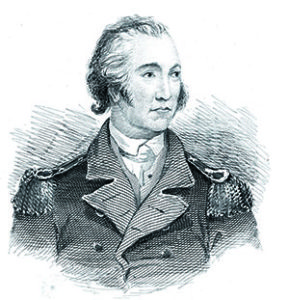
Three delegates were selected—one from the North, another from the Middle States, and a third from the South: John Adams of Massachusetts, Benjamin Franklin of Pennsylvania, and Edward Rutledge of South Carolina. The three left Philadelphia on September 9 and in two days reached Perth Amboy, New Jersey. The admiral’s barge was waiting to take the delegates to the landing at Captain Christopher Billopp’s estate on Staten Island, where Lord Howe welcomed the Americans. Billopp’s two-story stone mansion, being used to house military guards, was as “dirty as a stable,” according to Adams. In an effort to enhance the occasion, Lord Howe had had two rooms cleaned.
Franklin knew Howe fairly well; the others had not met him. They spoke at dinner. Not surprisingly, the parties found no common ground, as none existed. Howe was frank in telling his guests that only after the colonies surrendered could real negotiations about the future take place. That was a nonstarter—as Howe’s betters meant it to be. Germain and the king had imposed the requirement to keep total control of any talks. In spite of this, Howe insisted that acceptable terms could be worked out after surrender, but he wasn’t convincing.
Franklin told Howe that it was too late for the colonies to return to the empire. Too much had been inflicted on Americans for them to reverse course. “Forces have been sent out and towns have been burned,” Franklin said. “We cannot now expect happiness under the dominion of Great Britain. All former attachments have been obliterated.”
Adams and Rutledge felt the same. Discussion continued, however. Franklin wanted to suggest a real alternative. Not expecting the British admiral to agree, the American wanted to open Howe’s mind to the possibility of an approach that might avoid needless slaughter. To begin with, Franklin argued, independence was inevitable. Even if, in some sense, Britain won the war under way, victory would only mean an indefinite period of unrest requiring a large army of occupation. Perpetual resistance inevitably would move London to try to remake colonial society, which could never work. British troops would become a permanent fixture, as in Ireland, keeping down a hostile population and impoverishing both countries.
Instead of compounding Britain’s errors and fighting a long, expensive war that Britain could never win, Franklin said, London should accept American independence, which would cost nothing. Trade between the two countries could flourish, enriching both, as trans-Atlantic commerce had in the past. Britain and America had been each other’s principal trading partners. They could be again. Why not bring that lucrative business back to life, as an alternative to endless bloodshed? In time, even an alliance was possible. Why would that future not be better than constant, costly strife?
Even though Franklin knew he and his colleagues had no chance of persuading Howe’s superiors, he did not feel the exercise was a waste of time. Franklin wanted the admiral to be aware of an attractive alternative to civil war. The Pennsylvanian did not expect to change Howe’s mind about independence, but he did want to give Howe something to think about.
What Howe actually thought was that the war would continue. With his brother he wrote a joint letter to Germain, telling the secretary of state, “We do not yet perceive any symptom of that disposition to allegiance and submission to legal government, which would justify us in expecting to see public tranquility soon restored.”
In the same letter, Howe said that Franklin and cohort “were very explicit in their opinions, that the associated colonies would not accede to any peace or alliance, but as free and independent states; and they endeavored to prove that Great Britain would derive more extensive and more durable advantages from such an alliance, than from the connection it was the object of the commission to restore.”
Franklin could not even convince Lord Howe, never mind King George III, that independence was a realistic way out of the bloody mess they were in.
The king could never accept an independent America. Independence would avert a war, save a fortune, and preserve thousands of lives—but also would diminish England’s power and prestige, diminish the empire’s place in the world, and that was intolerable. The benisons of renewed friendly relations, trade, even an alliance aside, the king abhorred the thought of destroying Britain’s dominion over North America.
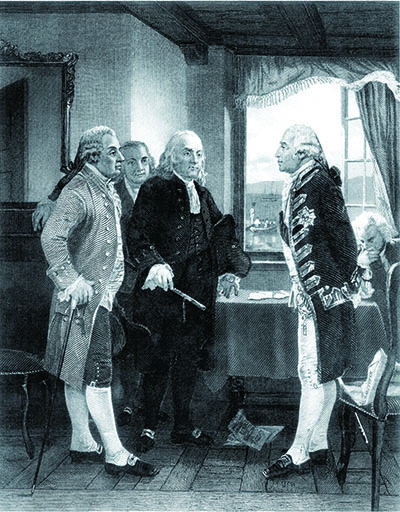
Germain and the Earl of Sandwich, first lord of the Admiralty, felt the same. After that spectacular victory on Long Island, the king’s men expected submission, not a negotiated settlement, and certainly not independence. Their fixation on military power was too strong to consider any alternative, particularly when they appeared to be winning.
Adams shared his impressions of the meeting in a letter to wife Abigail: “Yesterday morning I returned with Dr. Franklin and Mr. Rutledge from Staten Island, where we met Lord Howe and had about three hours conversation with him. The results of this interview will do no disservice to us. It is now plain that his lordship has no power but what is given him in the act of Parliament [the Prohibitive Act]. His commission authorizes him to grant pardons upon submission, and to converse, consult, and advise with such persons as he may think proper upon American grievances, upon the instructions to governors and the acts of Parliament, and if any errors should be found to have crept in, His Majesty and the ministry were willing they would be rectified…His lordship is about fifty years of age. He is a well-bred man, but…his head is rather confused.”
The Staten Island talks did not serve Lord Howe well, making him appear to be a negotiating novice out of his depth. but these interactions were of great importance to the patriots, giving their military forces critical time to recover somewhat from that terrible beating on Long Island.
Had General Richard Howe, instead of pausing to allow his brother time to negotiate, immediately followed his victory with an attack on Washington’s depressed army in Manhattan, that assault likely would have been fatal to the Revolution. ✯





